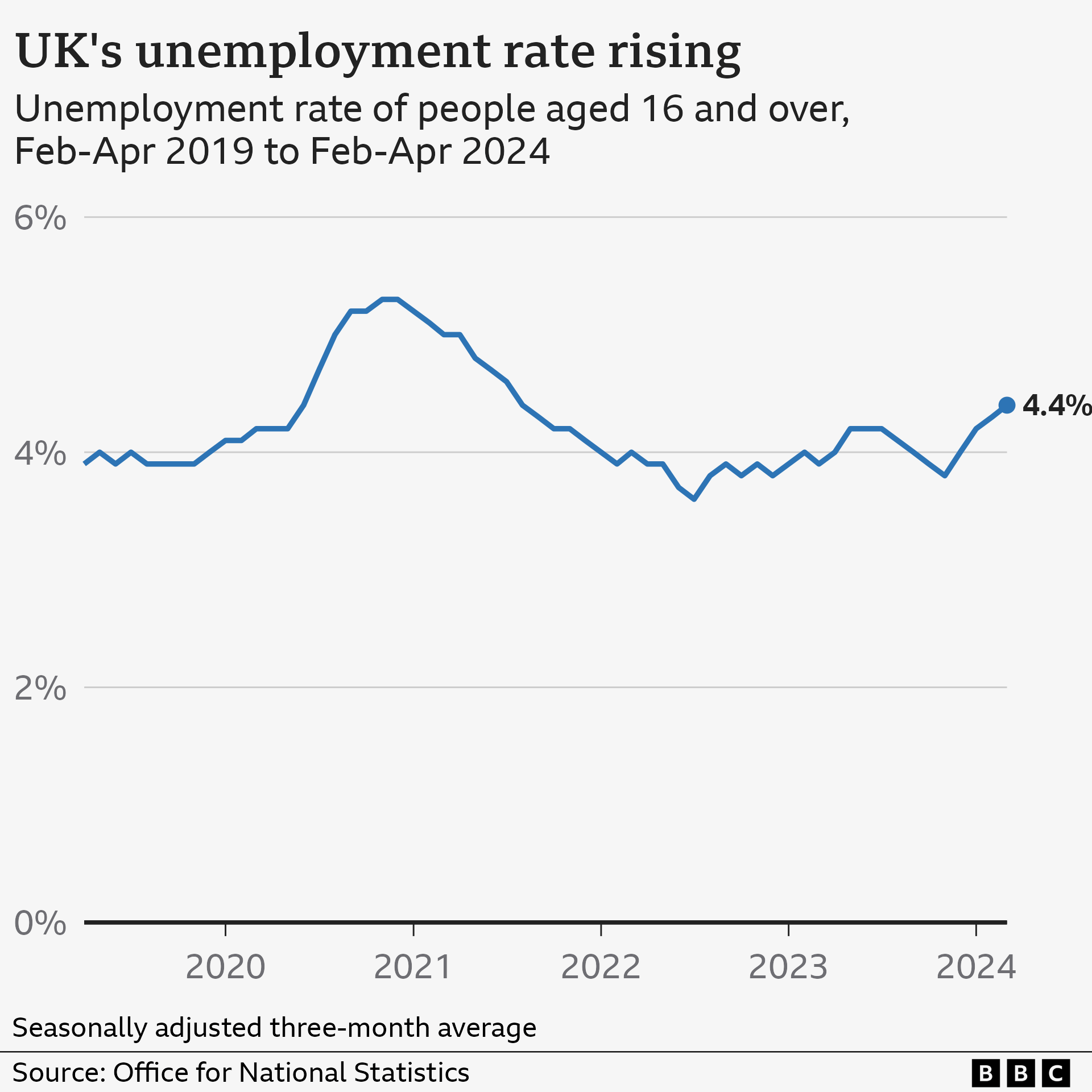Unemployment rate highest for more than two years

- Published
The unemployment rate has unexpectedly risen to its highest level for two and a half years, official figures show.
The rate climbed to 4.4% in the three months to April, the highest since September 2021.
Despite the increase, wage growth remained strong, with earnings continuing to rise faster than prices.
There was another increase in the inactivity rate, bringing it to its highest level in nearly a decade, with more than a fifth of working-age people deemed not to be actively looking for work.
"This month's figures continue to show signs that the labour market may be cooling, with the number of vacancies still falling and unemployment rising, though earnings growth remains relatively strong," the Office for National Statistics (ONS) said.
Regular earnings - which exclude bonuses - rose at an annual pace of 6%, the ONS said, unchanged from the previous month.
However, when the impact of inflation is stripped out, pay increased at an annual pace of 2.9%, the highest since August 2021.
Economists had been expecting an uptick in pay because of the increase to the National Living Wage in April. For people aged 21 and over, it rose to £11.44 an hour, up 9.8% from last year.
While the ONS has urged caution about the unemployment figures because its survey sample is small, they are backed up by the more recent figures on employers’ payrolls, which show the number of employees dropped by 36,000 between March and April, and continued to drop in May.
The number of job vacancies also fell, down by 9,000 to 904,000.
The ONS figures, external showed that 22.3% of working-age adults in the UK are deemed not to be actively looking for work, which is more than nine million people.
Concerns have been raised over worker shortages affecting the UK economy, and the inactivity rate among adults has remained at a persistently high level in recent years since it first surged during the pandemic.
The figure is now at its highest since 2015, with the rise in long-term sickness a key factor. Since 2022, it has become the number one reason why working age people are economically inactive.

The latest data will be studied by the Bank of England to help decide in the timing of its first interest rate cut since the start of the pandemic.
The Bank will meet next week to discuss interest rates, but KPMG's chief economist Yael Selfin said the "mixed" data was "unlikely to shift the dial at the Bank of England", predicting that it would keep rates unchanged this month.
She said that the weaker demand for staff had been attributed "to a lack of roles and firms delaying hiring decisions".
Abrdn's deputy chief economist Luke Bartholomew said: "UK wage growth remains very strong, but with further evidence that the labour market is cooling, this report is unlikely to significantly change the thinking at the Bank of England.
"We expect the first rate cut in August, but that is dependent on further progress on bringing down underlying inflation pressure over the next few months," he added.
Work and Pensions Secretary Mel Stride told the BBC the unemployment rate had only increased “slightly” and that it was “still at a historically, relatively low, level”.
“Our record on employment is extremely strong,” he added.
Labour’s shadow work and pensions secretary Liz Kendall said: “Today’s figures confirm that the Tories have no hiding place after 14 years of abject failure."
Liberal Democrat Treasury spokesperson Sarah Olney said: “This Conservative carousel of chaos has our economy on a rollercoaster ride and the British people are sick and tired of it."
SNP economy spokesperson Drew Hendry said: "These latest figures show that the Tories have trashed the economy with years of austerity, Brexit and a cost-of-living crisis – and have no plan to fix it."
A Green Party spokesperson said rising unemployment “combined with decaying public services [...] is a fitting but tragic testament to a government that is out of touch and out of time”.
A Plaid Cymru spokesperson noted that Wales had the highest economic inactivity rate and the lowest employment rate, describing it as "a damning indictment both on the Conservatives at Westminster and Labour in Wales".
The BBC has also approached Reform UK for comment.
Related topics
- Published10 June 2024

- Published9 June 2024

- Published26 March
